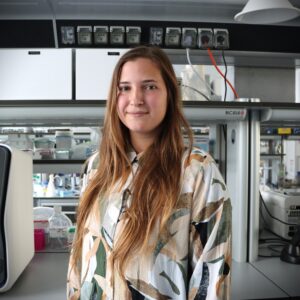
Iorio Group
Iorio group’s Apps, Tools and Computable Manuscripts
Lo Iorio Group lavora tra biologia, machine learning, statistica e teoria dell’informazione con l’obiettivo di comprendere e prevedere il ruolo delle alterazioni genomiche e dei tratti molecolari derivanti da altre -omiche nei processi patologici, nel ri-cablaggio dei circuiti biologici e il loro impatto sulla risposta terapeutica nei tumori umani e in altre malattie.
La nostra ricerca mira a migliorare la salute umana sviluppando algoritmi, strumenti di calcolo e nuovi metodi analitici per l’integrazione e l’analisi di set di dati di farmacogenomica e genomica funzionale, con l’obiettivo di identificare nuovi target terapeutici, biomarcatori e opportunità per il riposizionamento dei farmaci.
Con i nostri collaboratori, stiamo contribuendo alla creazione di una mappa completa di tutte le dipendenze genetiche e le vulnerabilità dei tumori umani e allo sviluppo di un’infrastruttura computazionale per tradurre questa mappa in linee guida per le fasi iniziali dello sviluppo di farmaci e per la medicina di precisione.
Sviluppiamo, implementiamo e gestiamo metodi bioinformatici e nuovi strumenti per la valutazione di modelli preclinici, la pre-elaborazione, l’analisi e la visualizzazione di dati provenienti da screening di genome-editing, per la correzione in silico di bias specifici in tali dati e per l’ottimizzazione di librerie di RNA a guida singola per screenings CRISPR-Cas9 aggregati e altri setting sperimentali.
Il nostro interesse è anche rivolto all’analisi di big-data, allo sviluppo di modelli predittivi biomedici basati su dati non biomedici, e a strategie informatiche efficienti per la randomizzazione vincolata utile a testare proprietà combinatorie in reti biologiche e dati genomici su larga scala.
Membri del gruppo
-
 Francesco Iorio
Francesco Iorio
Research Group Leader -
 Fateema Hani Bazzi
Fateema Hani Bazzi
Undergraduate Intern -
 Lorenzo Mathieu Brochier
Lorenzo Mathieu Brochier
PhD Student -
 Ottavio Croci
Ottavio Croci
Senior Data Scientist -
 Alessandro Digilio
Alessandro Digilio
Postgraduate Fellow -
 Irene Fernández Rebollo
Irene Fernández Rebollo
PhD Student -
 Raffaele Iannuzzi
Raffaele Iannuzzi
PhD Student -
 Athanasios Oikonomou
Athanasios Oikonomou
Postdoc -
 Flavio Passante
Flavio Passante
PhD Student -
 Ludovica Proietti
Ludovica Proietti
Postdoc -
 Nevenka Radic
Nevenka Radic
Postdoc -
 Aurora Savino
Aurora Savino
Postdoc -
 Vanessa Spagnolo
Vanessa Spagnolo
Technician -
 Yasin Tepeli
Yasin Tepeli
Scientific Visitor -
 Gianluca Vozza
Gianluca Vozza
Postdoc
Pubblicazioni
-
01/2021 - Nature Computational Science
Redefining false discoveries in cancer data analyses
The nature of biological networks still brings challenges related to computational complexity, interpretable results and statistical signifcance. Recent work proposes a new method that paves the way for addressing these issues when analyzing cancer genomic data.
-
10/2020 - Nucleic Acid Research
Project Score database: a resource for investigating cancer cell dependencies and prioritizing therapeutic targets
CRISPR genetic screens in cancer cell models are a powerful tool to elucidate oncogenic mechanisms and to identify promising therapeutic targets. The Project Score database (https://score.depmap.sanger.ac.uk/) uses genome-wide CRISPR–Cas9 dropout screening data in hundreds of highly annotated cancer cell models to identify genes required for cell fitness and prioritize novel oncology targets. The Project Score […]
-
08/2020 - Patterns
Identification of Intrinsic Drug Resistance and Its Biomarkers in High-Throughput Pharmacogenomic and CRISPR Screens
High-throughput drug screens in cancer cell lines test compounds at low concentrations, thereby enabling the identification of drug-sensitivity biomarkers, while resistance biomarkers remain underexplored. Dissecting meaningful drug responses at high concentrations is challenging due to cytotoxicity, i.e., off-target effects, thus limiting resistance biomarker discovery to frequently mutated cancer genes. To address this, we interrogate subpopulations […]
-
08/2020 - Pigment Cell and Melanoma Research
Analysis of CRISPR‐Cas9 screens identify genetic dependencies in melanoma
Targeting the MAPK signaling pathway has transformed the treatment of metastatic melanoma. CRISPR‐Cas9 genetic screens provide a genome‐wide approach to uncover novel genetic dependencies that might serve as therapeutic targets. Here, we analyzed recently reported CRISPR‐Cas9 screens comparing data from 28 melanoma cell lines and 313 cell lines of other tumor types in order to […]
-
07/2020 - Molecular Systems Biology
Drug mechanism‐of‐action discovery through the integration of pharmacological and CRISPR screens
Low success rates during drug development are due, in part, to the difficulty of defining drug mechanism‐of‐action and molecular markers of therapeutic activity. Here, we integrated 199,219 drug sensitivity measurements for 397 unique anti‐cancer drugs with genome‐wide CRISPR loss‐of‐function screens in 484 cell lines to systematically investigate cellular drug mechanism‐of‐action. We observed an enrichment for […]